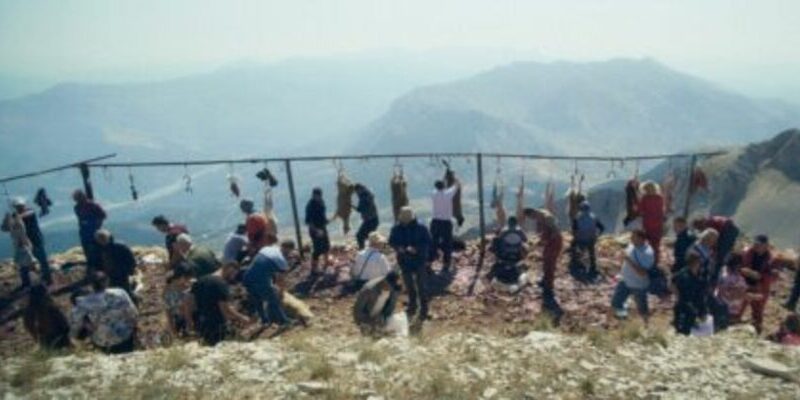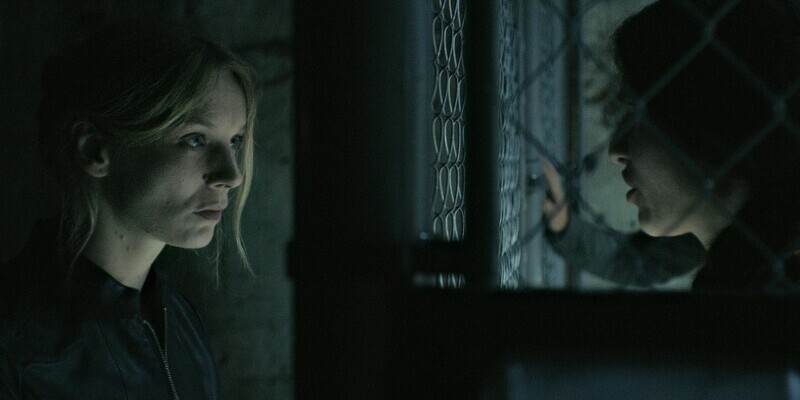
A representative of a shady corporation is dispatched to Albania to
convince farmers to sell their land.
Review by Eric Hillis
Directed by: Sudabeh Mortezai
Starring: Lilith Stangenberg, Jetnor Gorezi, Steljona Kadillari, Mirando
Sylari

There's an early scene in writer/director Sudabeh Mortezai's
Europa that sees a young Albanian translator give a pair
of westerners a tour of bunkers built during the communist regime of the
dictator Enver Hoxha. The young man speaks of how the dictator was
paranoid about being invaded by the west, but that the invasion never
happened.
The ensuing film suggests that Hoxha was right to be paranoid, that the
western invasion of his country is now underway. The invaders don't roll
into town in tanks, rather they're chauffeured around, and rather than
military fatigues, they favour pantsuits.

One such invader is a shady corporation known as Europa. Intent on
getting its hands on land that has been occupied by generations of
Bektashi farmers, Europa has dispatched an Austrian representative,
Beate (Lilith Stangenberg), to convince the farmers to leave
their homes. To do so she's weaponised western liberalism, dangling the
carrot of scholarships to young Albanian women eager to taste a world
they only see on the screens of their smartphones.
Before heading to the valley in question, Beate visits a university in
Tirana and delivers a Hillary Clinton-esque speech filled with vague
references to "diversity" and "empowerment," promising that Europa is
committed to the young women of Albania, whom they view as "the future
of Europe."
As is usually the case with corporations that make such claims, it's
all bollocks of course. Beate simply needs to get those pesky peasants
out of her way, and if she can turn their daughters against them, all
the better.

From a liberal western perspective, you can sympathise with the desire of such
young women to leave their homes and pursue their own dreams rather than
those of their parents. But in a wider sense you can also sympathise
with people who have no interest in leaving the land they've called home
for hundreds of years. The Bektashi might be considered a regressive,
even misogynistic culture, but any change must come from within, not
from bullying outsiders, especially those with dubious motivations like
Europa.
The exact nature of Europa is kept ambiguous, but we're given enough
evidence to suggest they're not in Albania to build nurseries. When
dealing with the locals, Beate puts on a friendly face and speaks of how
striking a deal can help the community. But as soon as she leaves their
homes she reaches for hand sanitiser, and on video calls to her family
she mocks their primitive ways. When offered the traditional drink of
Raki, she either winces or passes the glass on to her assistant, and one
deal is almost scuppered by her refusal to eat the food a local woman
has lovingly prepared.
When Beate receives a phone call in the middle of the night we see a
more explicitly malevolent side emerge. A group of young westerners who
claim to be urban explorers but whom Beate suspects of activism are held
captive in a cage when they're caught intruding in one of Europa's
sites. Beate interrogates the group like a Gestapo officer, and we're
left to wonder if the movie is about to take a particularly dark turn at
that point.

As Beate, Stangenberg is a terrifying presence, one of the great
villains of recent cinema. It's riveting to watch her move through the
gears as Beate gradually changes her approach from a benevolent figure
who claims to want to improve the life of a disadvantaged community to
one who employs the sort of tactics you might expect from a mobster
running a protection racket. Hitting a brick wall, she sells herself as
the lesser of two evils, telling the villagers that if they don't agree
to her terms they'll have to deal with someone who will treat them far
worse. It's difficult not to think of how today's liberal politicians
sell themselves to voters.
At the same time, we're left in no doubt that for all her ruthless
ambition, Beate is merely a footsoldier. We see her patronised and
condescended to by an American (of course) male superior who clearly
knows her attractive female features have a better chance of getting
away with such shady dealings than a white man. When Beate tries to
manipulate the daughter of a stubborn farmer into guilt-tripping her
dad, the pair communicate in English, two levels of colonisation at play
without a single shot needing to be fired.


